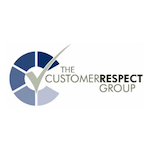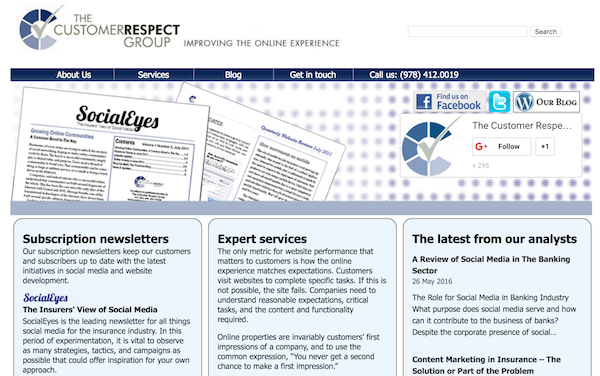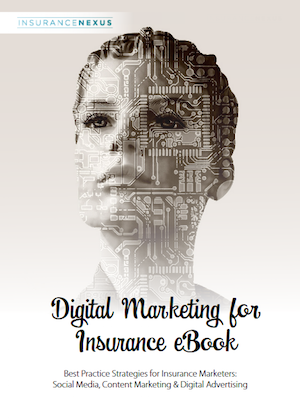The Customer Respect Group?s president Terry Golesworthy on the Digital Marketing Strategies for Insurance: Exclusive Ebook
 Social Media Portal (SMP): What is your name and what do you do there The Customer Respect Group?Terry Golesworthy (TG):
Social Media Portal (SMP): What is your name and what do you do there The Customer Respect Group?Terry Golesworthy (TG): I?m Terry Golesworthy, president managing our practice on digital strategies in the insurance and banking industries.
SMP: What does The Customer Respect Group do?TG: For over six years we have benchmarked, monitored and commented on the digital and social media activity in the financial services industries.
SMP: You?ve recently released an ebook entitled Digital Marketing Strategies for Insurance: Exclusive Ebook what is it about?TG: I was one of the contributors and the objective was to provide thought leadership for insurers that are or need to enhance digital marketing activities.
 SMP: You?re guest speaking at I2C: Insurance2Cusomter USA Summit 2016 in September, what is your session entitled and what will you cover?TG:
SMP: You?re guest speaking at I2C: Insurance2Cusomter USA Summit 2016 in September, what is your session entitled and what will you cover?TG: My session is ?Social Media 2.0, The New Role for Social Media Across the Insurance Industry?.
We need to acknowledge that some of the early shine and excitement of social media has fallen away and this has led to some insurers paying less attention or merging social into larger groups. Social media however now plays a new and possibly larger role in the industry as it permeates every business function. Most, if not every business activity, has some social potential and we must think about social media in this new expanded light.
SMP: What are you most looking forward to at the summit? TG: The conference is attracting some of the most innovative thinkers in the industry both as speakers and attendees. For an industry that is traditionally slow to change but open to disruption, I am looking forward to speaking and hearing from others about how the industry can adapt within the tight regulatory constraints with which it must comply.
SMP: What do you see as the biggest challenges and opportunities for insurance companies are in the social media space and the competition they may have?TG: The business challenge is that customers have little or no contact with their insurer aside from a policy renewal or a claim (both negative circumstances) and therefore few reasons for loyalty. Social media does seem to offer opportunities to increase rates of interaction but the majority of customers have little or no interest in connecting with an insurer.
Insurers in general have been slow to adapt and the majority of social strategies remain based around traditional marketing and pushing out company messages. Social media can be effective but only with a different way of thinking; what information would the customer value and ideally share with friends and family? (Hint: this is not product information).
SMP: What is the most challenging part for insurance brands building social media presence in digital environments and why?TG: It has been almost impossible for social media groups to match social activity directly with ROI but that?s because there is (in most cases) not a direct link. Social media is effective as part of a broader communication strategy and how it is deployed and measured should be based upon specific business objectives. A social based customer service program for a car insurer is not the same as a pre-product selection education program for a life insurer. The mistake in the early days was to concentrate on identical vanity metrics e.g. followers. This continues even today but the focus has shifted to ?engagement?. These metrics are ?gameable? and carry little value in the business. Agreeing on the business outcome in advance is the only way to succeed.
SMP: What do you think is going to be the most interesting aspect regarding social media, social networks and/or technology for the next 12 to 18-months and why?
TG: Critical for the industry is how to reach the elusive millennial customer. This is where social can really make a difference - with the constantly connected customer. The approach needs to be more innovative and this could drive different and more suitable products.
Facebook is probably not the social platform that will work but how does insurers use platforms they don?t understand (for example Snapchat and Instagram) to promote as yet under-served policies (Renters insurance, car sharing, etc.) to people that will be active primarily on mobile devices.

SMP: What are your top five predictions for social media for the next 12 to 18-months and why for insurance / financial companies?TG replies with:
- Twitter priority will drop. The platform does not reach broad the customer base, especially younger customers and increasingly will be used solely as a PR news feed.
- Visual and video posts are increasingly important and this will drive greater emphasis towards Instagram and Snapchat but this will also challenge content development budgets.
- Support of Facebook Messenger on mobile devices will become a requirement for customer service as younger customers prefer Messenger to phone and insurers also prefer Messenger to Twitter.
- Social posts and blog articles focused on addressing or educating customers on problems will act as effective entry points for customer journeys. Social entry could eclipse web sites as the logical entry point for new customers but this calls for greater integration between social and business functionality such as product information, calculators and agent finders.
- More social micro-segmentation to reach communities that engage with each other. We see great success with USAA (service personnel), AARP (retired persons)/Foremost Insurance page for motorbikers, Acuity InGear (for long distance truck drivers), State Farm Latino (for Hispanic customers), Farmer Charlie (Farmers in Tennessee) etc. Being fellow customers of a specific insurer does not make a community. A social destination needs to provide value to the community and this will challenge insurers to manage a multitude of communities stepping away from the convenient one-size fits all approach.
SMP: What are your top overall five social media tips and why for insurance / financial companies?TG replies with:
- Social media awareness and activity must now be part of every department and not siloed in a corner or added to a single department (marketing).
- Don?t fall into the trap of using the intern/youngest person to manage social media; it is a business activity that deserves experience.
- Make use of the unique advantages of social media and not regard it as just another digital marketing channel.
- Employees and agents are potential advocates who pay attention to everything you do and most are connected socially. Train them on what they can do and not what they cannot do.
- Listen more than you post. Customer feedback, requirements, thoughts are everywhere; make sure you gather this valuable information and data to help adapt messages, products and internal thinking.
SMP: Is there anything else we should know, or is there anything that you?d like to share?TG: Social media is not going away. It may not be disrupting the industry in the way we might have thought five years ago but it has changed forever the way people research, discuss and recommend products and companies. This has had a long-term impact on the way people buy products and services including insurance. It is no longer how we want to sell, but about how people want to buy.
SMP: Best way to contact you and The Customer Respect Group?TG replies with:
Twitter
@terrycrg,
LinkedIn,
Facebook, the
blog and telephone: +19784120019
Now some questions for fun
SMP: What did you have for breakfast / lunch?TG: My wife has encouraged me to drink smoothies for breakfast so I feel I have resorted back to baby food.
SMP: What?s the last good thing that you did for someone?TG: I offered to help my brother in law fix his air conditioning while he was away. He spent the summer drinking Nebbiolo in Italy. I suffered through the heat wave waiting for over worked A/C contractors to show all summer.
SMP: If you weren?t working at The Customer Respect Group what would you be doing?
TG: Traveling the world as a trip adviser (drinking Nebbiolo).
SMP: When / where did you go on your last holiday and why?TG: Turin ? free accommodation seemed to be a compelling reason at the time and it actually is a beautiful city.
SMP: What?s the first thing you do when you get into the office of a morning?TG: Check email, Twitter, LinkedIn, Facebook and then its lunchtime
SMP: If you had a superpower what would it be and why?
TG: Really fast reader with photographic memory. With so content to read, it is impossible to keep current. My ?must read? folder is getting bigger and bigger.
 Receive a free copy of the Digital Marketing Strategies for Insurance: Exclusive Ebook over at the Nexus Insurance website.Learn more about the I2C: Insurance2Cusomter USA Summit 2016 at SMP events and an interview with the Insurance Nexus head of strategy Emma Sheard. Use Discount code SMP150 for $150 off the rate of the day for conference registration.
Receive a free copy of the Digital Marketing Strategies for Insurance: Exclusive Ebook over at the Nexus Insurance website.Learn more about the I2C: Insurance2Cusomter USA Summit 2016 at SMP events and an interview with the Insurance Nexus head of strategy Emma Sheard. Use Discount code SMP150 for $150 off the rate of the day for conference registration.
Got an interesting story to tell? Get in contact.